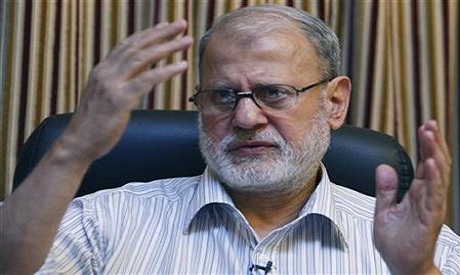 Mozakerat Mohamed Habib(Diaries of Mohammed Habib on Life, Politics and Thought) by Mohammed Habib, Cairo: Shorouk Publishing House, 2012. 528pp.
Mozakerat Mohamed Habib(Diaries of Mohammed Habib on Life, Politics and Thought) by Mohammed Habib, Cairo: Shorouk Publishing House, 2012. 528pp. The memoirs of Mohammed Habib, a former senior leader of the Muslim Brotherhood, focus on the period when he joined the group in the early 1970s until he became its second-in-command.
It is remarkable how quickly he covers his early life. He examines in particular the period after 1969 when a Brotherhood member visited him and later succeeded in recruiting him to the group.
Habib draws a clear and rich picture of how the Brotherhood works, especially inside trade unions and syndicates. He led the Brotherhood’s efforts inside Egyptian university faculty clubs for two decades.
Habib recalls his experience as leader of the Assiut University faculty club for two terms. The social activities of the club included local services, camps, contests, educational courses, cooking, in addition to sports and cultural events. Habib also helped establish healthcare centres. All these activities aimed to introduce members to the ideas of the Brotherhood.
These activities, which made Habib very popular, helped him to be elected MP for Assiut in 1987.
Habib explains that families are the first cells in the structure of the Brotherhood. He describes how every family is expected to participate in public life and execute the commands of the group's leaders.
He also gives a detailed view of his election in 1985 to the group's Guidance Office, where all important decisions are made.
Habib was jailed twice. The first time was in 1981 when President Sadat arrested around 1,500 political opponents. The second time was in 1995 when many Brotherhood leaders were arrested and jailed for alleged militant activity.
Habib points out that the group has an office in every important European and Arab country. These offices make decision on a local level and the Guidance Office in Cairo acts as a command centre.
He spends time describing his visits to Saudi Arabia, Lebanon, Switzerland, and the role of Youssef Nada, the tycoon who established an arm of the group in Europe.
Habib closes his memoirs with a chapter entitled 'The Brotherhood and Power'. He explains the relationship between the Brotherhood and the regimes that ruled Egypt since 1928.
Habib criticises the "policy of possession" whereby the group seeks to take over public or independent institutions and make them serve the Brotherhood's agenda.
He does not refer to the group's financial affairs and leaves a number of important questions unanswered. The group spends a lot of money, especially in Europe, but Habib remains silent on the issue.



